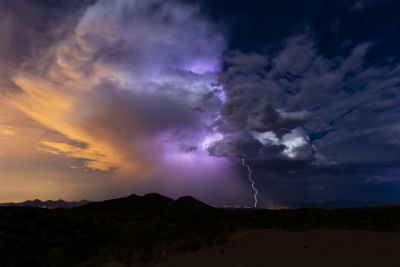
Hurricane season raises concern from June to November every year on the Atlantic Coast of the United States, and the National Oceanic and Atmospheric Administration predicts a busier than usual 2022 season.
However, according to NOAA, summer thunderstorms “are more frequent and directly impact more people and homes in the U.S. than hurricanes.” An estimated 100,000 thunderstorms cause damage and threaten human life in the U.S. each year.
“Between late April and June 2022, over 1,300 storm-related claims have been reported in Virginia,” Laurie Gannon, vice president of claims for Virginia Farm Bureau Mutual Insurance Co, said in a press release. “Whether it’s small, localized pop-up thunderstorms or significant storm bands with tornadic winds, the late spring and early summer have been busy for our department.”
Thunderstorms bring drenching rains, flooding, high winds, lightning and hail —all of which create the potential for billions of dollars in damages. According to the Insurance Institute for Business & Home Safety, approximately 3,000 hailstorms each year cause $1.6 billion in insurance losses. IIBHS said that hail is possible in any strong thunderstorm, as well as lightning, and responsible for more than $1 billion in losses.
Preparing your home against storm damage can mitigate loss. In its thunderstorm preparation guide, the IIBHS recommends installing a home lightning surge protector to save electrical equipment in the event of power surges. Overhanging branches should be removed near homes, as well as dead, dying or diseased trees, to prevent tree damage. Roof inspection is important, especially ensuring that it is securely fastened to the roof sheathing and any damaged shingles are replaced. The roof deck should be sealed to minimize water getting into the attic in the event the roof blows off the house.
Outdoor equipment, including heating, ventilating and air conditioning units, should have protective screens installed around them to reduce hail damage. Cleaning and maintaining gutters and downspouts can minimize the risk of water damage and ensure that downspouts divert water away from the foundation.
Outdoor items, such as patio furniture, planters, grills, garbage cans and toys, should be stored in a garage or basement before a storm to prevent damage and injury.










